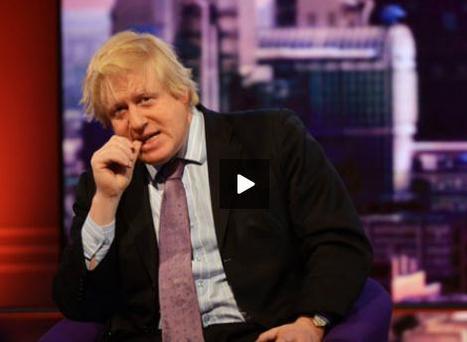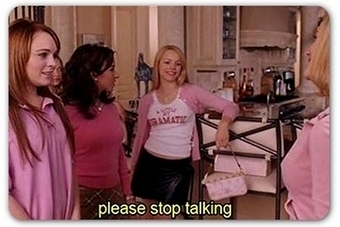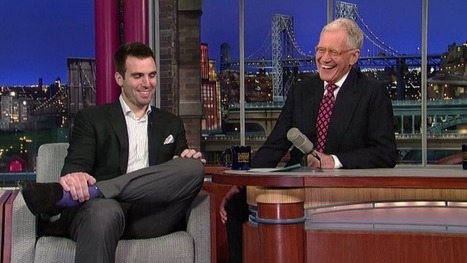 Your new post is loading...
 Your new post is loading...
Apparently John Tortorella has little patience for reporters. As coach for the the N.Y. Ranger hockey team, some might argue that media relations is part of his job -- but it is clear that he would rather try to water ski behind a Zamboni than have to respond to journalists.
During my first reporting shift at CNN in 1999, I was invited into a “question” meeting with Wolf Blitzer and his executive producer.
The three of us sat around for 15 minutes, coming up with questions for former Vice President Dan Quayle, who was mounting a bid for the 2000 GOP nomination.
We developed a seemingly impressive list of questions, but I noticed that the questions all fit inside certain categories. For instance, some questions were intended to be “stumpers,” while others called for speculation.
That taught me an important lesson. Spokespersons don’t need to prepare for every possible question. They just need to prepare for every type of question. Below, you’ll find six types of questions reporters always seem to ask—and how to answer them with ease....
Press conferences can play an essential role in media communications, particularly for major news announcements, in political campaigns, and during crises.... Press conferences can be tricky, since reporters from competitive news organizations often play a game of one-upmanship to see who can ask the most difficult question. For that reason, press conferences—especially those about controversial or challenging topics—require a deft spokesperson. Ask yourself whether a press conference is truly the best way to release information before scheduling one. If you decide to proceed with a press conference, here are four rules to remember...
When journalists choose experts, star power matters. Scientific research into the relationship between journalists and experts.... ... What’s interesting to see is how journalists choose the experts they call. In more than 90 % of the cases, it’s the journalist who initiates the contact – this is based on reporting by both the experts and the journalists. Only a small amount of the contacts is based on a press release by the expert. (Note: this is probably due to the fact that Albaek surveyed scientists, who as a whole are not very PR savvy. I think the numbers would look different had he included experts in different fields.) Still: overwhelmingly, the media set the agenda. An even more striking conclusion is the answer to the question: how did the journalist choose the expert? Albaek writes: “When journalists contact researchers, a Matthew effect comes into play: researchers who have been used extensively in the past are simply used further.”...
The popular mayor of London, Boris Johnson, gets his head handed to him in this recent interview. Johnson usually tries to joke his way through interviews. He is a classic example of someone who is unprepared to answer tough questions.
Gone are the days of the hidden, tiny text box where a publication admits it made a reporting error. In today’s digital media age, you no longer have to wait days or weeks to rectify incorrect or inflammatory comments made about your client. You can now ask outlets for updates to be made online almost immediately. But the question remains: Does the value of correcting what you and your client see as inaccurate outweigh the risk of getting sideways with a reporter who will likely cover your client again? In GroundFloor Media’s recent experiences, the answer is a resounding yes....
Are reporters missing the story you’re trying to tell? Are they ignoring you altogether? Maybe you’re suffering from a common disorder in PR.... Sure, providing reporters with the information they need in order to file a story is an important part of your job as a spokesperson. But the more detail you provide, the more likely a secondary or tertiary point will make its way into the story instead of a primary one. Put another way, a media interview isn’t about downloading your knowledge—it’s about prioritizing your knowledge. As we tell our clients, the more you say, the more you stray. I’ll be even a bit more provocative here: Your main task as a spokesperson isn’t to give the reporter facts. If you merely spout facts, you’ll be no more valuable than a Wikipedia entry. Your job is to give those facts context and meaning....
In my decade as a media trainer, I've heard almost every question at least a dozen times. But this one surprised me a bit. I recently provided media training to a man who deals with a few controversial issues in his line of work. When we sat down to do a mock interview, he answered the more straightforward questions with relative ease. But when I began asking him about some of the particularly thorny issues he contends with, I noticed that one of his hands began to shake. As a journalist, that change in his body language signaled something important to me. It told me that he was uncomfortable with the more difficult topic—and that he might have been hiding information from me. As it turns out, I read the situation completely wrong....
Let’s say you’re a hedge fund manager. You know that many people in the public—even though they don’t fully understand what hedge funds are—hate your work. Some blame you for the financial collapse of 2008. A few even regard you as immoral. So when you’re interviewed by reporters who ask you about the unpopularity of hedge funds, your inclination is to defend what you do for a living and aggressively rebut their charges. It’s a natural instinct—but it’s also a mistake....
What you say in your interviews and speeches is incredibly important, but how you say it can make all the difference. When you listen to many of the most successful television and radio personalities, pay attention to how they alter their tempo or speak a little louder or softer when they want to emphasize a point. That change in their voice or pacing draws you in, signaling that what they just said—or what they are about to say—is something important you’ll want to remember....
...A survey conducted by the Pew Internet and American Life Project last July found that more than half of all television viewers use their phones ”for engagement, diversion, or interaction with other people while watching TV” at least once per month. That has dramatic implications for anyone who will ever be interviewed on television, since viewers will inevitably share some of the quotes from your interview on their social networks....
Is it okay for PR professionals to sit in on interviews, or is their presence a nuisance that gets in the way? Here's what reporters had to say. A PR professional once shared a memorable anecdote with me. She had arranged for one of her colleagues, a content matter expert, to speak with a reporter from The Washington Post. On the day of the interview, the two of them huddled in an office and called the reporter. They chose not to tell the reporter that the PR professional was on the line. At some point during the interview, the reporter picked up that someone else was in the room—and he exploded: “Who else is on the line? My interview is supposed to be with [NAME]. Get that other person out of the room!” I thought of that story recently when a Sports Illustrated writer named Richard Deitsch sent his followers the following tweet....
As the next installment in my series on message planning and delivery, I’d like to focus on preparing for media and analyst interviews – a critical component to generating brand awareness for your organization (or clients) and taking your message to the masses, one journalist at a time.
Here are the steps I recommend you take in preparation for media interviews, in order to consistently deliver your key messages to the influencers that reach your target audiences....
|
File this one away as one of the most ill-advised comments ever by a government spokesperson. Lois Lerner, a senior Internal Revenue Service official was on a conference call this afternoon briefing reporters on a brewing crisis. The IRS is admitting (after having denied it for some time) that some of their personnel inappropriately used their positions to target some conservative organizations. When trying to explain some statistics in relation to the matter Ms Lerner, a ranking IRS official, confessed "I'm not good at math." That's like the Surgeon General admitting that she can't stand the sight of blood....
... For example, The Wall Street Journal doesn’t want the same thing from you as People Magazine. Whereas The Journal might just need a quick quote from a financial analyst to plug into a short article, People might be looking to write a three-page profile of an ordinary person who overcame tremendous obstacles to achieve a remarkable feat. So what do the media want from you? It depends on the news organization, the reporter, the story, and the format. But as different as news organizations and reporters are from one another, almost all of them want the same six things from the media spokespersons they interview...
When Should PR Pros ‘Tell Journalists How to Do Their Jobs?’ Doh...bad PR... Well here’s a highly fraught debate: to what degree should PR pros manage the message in content created by the journalists they pitch? When does “making helpful suggestions” turn into “telling journalists how to do their jobs?” This week journalist Jim Romenesko (who everyone in media should follow on Twitter and Facebook) brings us a couple of cases in which he and some of his colleagues believe that PR pros went too far. In the first instance, a reader who is also a newspaper editor received an unusually bold pitch from a man who claims to transcend the traditional role of the flack...
...An eccentric tech entrepreneur turned fugitive, an abrupt change in the papacy, a Japanese tsunami – the fact that each of these stories dominated the news for days and drove a whole lot of traffic confirms that content still reigns supreme. But since every big-news scenario is different, figuring out the optimal timing, location and platforms for presenting it to the public remains an ongoing challenge for media brands. At MPA‘s recent Swipe 2.0 conference in New York, media presenters including CNN and Wired, discussed tablets and other new digital platforms to help get the message out. CNN’s reps explained their system for categorizing video content, while Wired offered a gripping account of how their reporting on tech security pioneer John McAfee factored into the unfolding odyssey....
CEO gaffes never cease to amaze and recently former Groupon CEO Andrew Mason had us scratching our heads when he compared his leadership to Battletoads.... At GroundFloor Media, we recommend that executive clients focus on knowing a few topics really well outside of their core day-to-day business, rather than trying to be an expert on everything. Doing so, positions c-level leaders as the real experts in key topic areas and provides guideposts for public comment. The media and other industry stakeholders will come to know these leaders as a go-to resource on specific issues and won’t necessarily expect them to stray from that expertise. Creating this framework and designated expertise is foundational to any executive visibility and reputation management program. For executives such as Groupon’s Mason, who may be over eager to discuss any topic that comes his way, it provides a framework to reign in their comments and stay on topic. And for executives at the other end of the continuum who might be hesitant to make themselves available to the media or public, it provides a platform for them to shine, limiting the risk of uncomfortable topics or difficult questions....
According to Howard Gardner, a professor at Harvard University, “Stories are the single most powerful weapon in a leader’s rhetorical arsenal.” Yet most people struggle to think of compelling stories that reinforce their messages. That’s usually because they’re trying to think of a “big” story. In order to help people get unstuck, I tell them to think smaller. I encourage them to think of a single customer whose life was improved because of their product or a community that is enjoying the benefits of a new public school. A story can be many things: your personal experience with a person, place, thing, or topic; somebody else’s experience; case studies in the news; or a historical or fictional example....
It's a tough paradox. If you don't respond to a crisis, you'll look bad. If you do, you may make more people aware of it. So what should you do? If your organization is in the midst of a giant, well-publicized media crisis, you can safely assume that most people have heard about it. Therefore, you don’t have to worry about your response widening awareness of the crisis. Since the public already knows about it, you’re not going to make them aware of the incident for the first time simply by responding to it. But what happens if your organization is in the middle of a “mini crisis,” one which is only known to a specific audience or is confined to a specific news outlet or medium? A reader named Nicole recently asked the following question: “Do you (or others) have any thoughts about how to carefully refute a negative story without directing a new audience to it? For example, if you decide to communicate to your audience via social media or a company website or blog, are you inspiring those who may have not seen the original negative story to seek it out?” I reached out to a couple of my PR peers for help in answering her question....
So is it okay in today’s media culture to ask reporters to see their stories before they run? Most PR professionals—particularly the experienced ones who have been in the business for many years—would likely answer that question with an emphatic “No!” And I generally agree with them, but not completely. Here’s what I’ve seen lately. While promoting my new book, I did about 20 interviews. Two reporters and one blogger both volunteered to send me their stories before they ran so I could fact check them and request changes. I would describe the news organizations as industry journals—not major mainstream news organizations. But even the majors have done it – one Washington Post reporter was caught last year sending drafts of his stories to sources and allowing them to make edits. I think we’re at the beginning of another shift in media relations, one which will lead to eventually being able to ask (some) reporters to preview their stories in advance. For now, I’d still advise my clients not to request stories in advance, unless they’re dealing with nontraditional smaller news organizations, bloggers who don’t adhere to traditional news standards, and perhaps some industry journals....
Appearing on television can be an odd experience. In one of the stranger (but more common) formats, you may be escorted to a closet-size booth, in which you will speak into a camera operated by a technician hundreds of miles away. This lesson will help strip away some of the mystery by arming you with 10 logistical and technical details you’ll need to know....
Joe Flacco may have won the Super Bowl MVP award, but the onus is on his surrounding PR staff to make his procession of media interviews pop. ...However, his father, Steve Flacco, told The New York Times: “Joe is dull. As dull as he is portrayed in the media, he’s that dull. He is dull.” And while Flacco may have been in the Ravens' trainers' hands all season, his efforts under the white-hot lights of the media now put him in the PR department's hands.
Here are 7 tips in handling an athlete on the media circuit....
I've rarely seen someone tell their interviewer that I'm not your monkey. But it seems like filmmaker Quentin Tarantino was very tired of answering this question. Filmmaker Quentin Tarantino has been making violent (but well-received) movies for the past two decades. His latest effort, Django Unchained, is the latest in a long line of bloody films. But unlike other Tarantino movies, Django was released less than two weeks after the tragic school shooting in Newtown, Connecticut, which spurred a new national conversation about the role of violence in our culture. Given that context, it’s unsurprising that reporters would ask Tarantino about the extreme violence in his films. But it’s clear from Tarantino’s answers in this interview with Krishnan Guru-Murthy of Britain’s Channel 4 News that he was tired of answering the question. (The exchange begins at 2:40.)...
Very little in life can be predicted or guaranteed with certainty. So when a reporter asks you if you can guarantee that something will happen “every time” or “never again,” you may have a tough time answering the question without offering some sort of caveat, such as “Well, there are no guarantees in life, but….” The problem, of course, is that your hedged answer will be used against you....
|
 Your new post is loading...
Your new post is loading...
 Your new post is loading...
Your new post is loading...






































NOT a pro when it comes to media relations. Somebody call an interview coach for wayward coach Tortorella. Nonetheless, a very entertaining news clip from the always unpredictable coach.